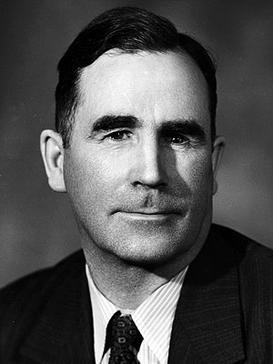The Progressive Party of Canada, formally the National Progressive Party, was a federal-level political party in Canada in the 1920s until 1930. It was linked with the provincial United Farmers parties in several provinces, and it spawned the Progressive Party of Saskatchewan, and the Progressive Party of Manitoba, which formed the government of that province. The Progressive Party was part of the farmers' political movement that included federal and provincial Progressive and United Farmers' parties.

The Canadian social credit movement is a political movement originally based on the Social Credit theory of Major C. H. Douglas. Its supporters were colloquially known as Socreds in English and créditistes in French. It gained popularity and its own political party in the 1930s, as a result of the Great Depression.
There have been various groups in Canada that have nominated candidates under the label Labour Party or Independent Labour Party, or other variations from the 1870s until the 1960s. These were usually local or provincial groups using the Labour Party or Independent Labour Party name, backed by local labour councils made up of many union locals in a particular city, or individual trade unions. There was an attempt to create a national Canadian Labour Party in the late 1910s and in the 1920s, but these were only partly successful.

John Bracken was a Canadian agronomist and politician who was the 11th and longest-serving premier of Manitoba (1922–1943) and later the leader of the Progressive Conservative Party of Canada (1942–1948).
Unity, United Progressive Movement and United Reform were the names used in Canada by a popular front party initiated by the Communist Party of Canada in the late 1930s.
Liberal-Progressive was a label used by a number of candidates in Canadian elections between 1925 and 1953. In federal and Ontario politics, there was no Liberal-Progressive party: it was an alliance between two parties. In Manitoba, a party existed with this name.

The Patrons of Industry in Canada were based on the Patrons of Industry of Michigan that had formed in 1889. It was dedicated to upholding and encouraging the moral, social, intellectual, political and financial situation of farmers and to preserve the way of life that existed in farming communities in the late nineteenth century against encroaching industrialization. It cooperated with the urban labour movement to address the political frustrations of both groups with big business.

The United Farmers of Alberta (UFA) is an association of Alberta farmers that has served different roles in its 100-year history – as a lobby group, a successful political party, and as a farm-supply retail chain. As a political party, it formed the government of Alberta from 1921 to 1935.

Douglas Lloyd Campbell was a Canadian politician in Manitoba. He served as the 13th premier of Manitoba from 1948 to 1958. He was a member of the Legislative Assembly of Manitoba for 47 years, longer than anyone in the province's history.
Richard Gardiner Willis was a politician in Manitoba, Canada. He was the leader of the Manitoba Conservative Party from 1919 to 1922, and served in the Legislative Assembly of Manitoba from 1922 until his death.
The Patrons of Industry in Manitoba was an extension of a farmers' organization operating in Ontario and the United States in the 1880s and 1890s. The Patrons lobbied extensively and became politically active, running provincial and federal candidates.
James Arthur Ross was a Manitoba politician. He served in the House of Commons of Canada for thirteen years, and was a candidate for the leadership of the Progressive Conservative Party of Manitoba in 1953.

Larry Maguire is a politician and activist farmer in Manitoba, Canada. Formerly a Progressive Conservative MLA in the Legislative Assembly of Manitoba, he was elected to the House of Commons of Canada in a by-election on November 25, 2013. He is a member of the Conservative Party of Canada and sits on the House Standing Committee on Human Resources, Skills and Social Development and the Status of Persons with Disabilities and the House Standing Committee on Public Safety and National Security. During the 43rd Canadian Parliament Maguire's Private member's bill, Bill C-208, An Act to amend the Income Tax Act was adopted.

The 1926 Canadian federal election was held on September 14, 1926, to elect members of the House of Commons of Canada of the 16th Parliament of Canada. The election was called after an event known as the King–Byng affair.
Lewis St. George Stubbs was a prominent judge and politician in Manitoba, Canada. He served in the Legislative Assembly of Manitoba from 1936 to 1949 as an Independent, He promoted left-wing and socially progressive causes including Henry George's Single Tax (Georgism).
Ewan Alexander McPherson was a politician in Manitoba, Canada. He served in the House of Commons of Canada from 1926 to 1930. He was also a member of the Legislative Assembly of Manitoba from 1914 to 1920 and from 1932 to 1936, and served as a cabinet minister in the government of John Bracken.
The 1922 Manitoba general election was held on July 18, 1922 to elect Members of the Legislative Assembly of the Province of Manitoba, Canada. The United Farmers of Manitoba won a narrow majority in the legislature.
Albert Daniel McGregor was a politician in Manitoba, Canada. He served in the Legislative Assembly of Manitoba from 1922 to 1927.
The Progressive Party of Saskatchewan was a provincial section of the Progressive Party of Canada and was active from the 1920s to the mid-1930s. The Progressives were an agrarian, social democratic political movement. It was originally dedicated to political and economic reform; it also challenged economic policies that favoured the financial and industrial interests in Central Canada over agrarian interests. Like its federal counterpart it favoured free trade over protectionism.






